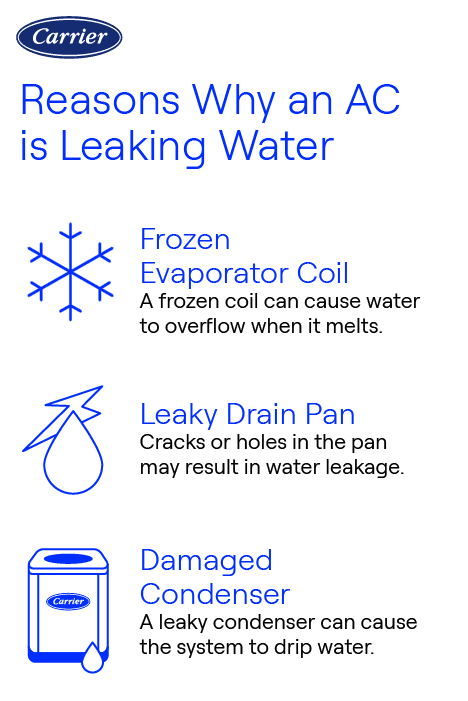About The Author: Travis Baugh is a Digital Brand Marketing Manager for Carrier, where he develops informative, straightforward content to help homeowners better understand heating, cooling, and indoor air quality. His writing is focused on empowering homeowners to make confident, well-informed choices about their home comfort systems.
Air Conditioners, HVAC Education
Why Is My AC Leaking Water?
Discovering a pool of water near your air conditioner can be alarming and perplexing. Air conditioner leaks are a relatively common issue, and understanding the underlying causes, as well as how to prevent them, can save you from significant damage and costly repairs. If you've been wondering, "why is my AC leaking water?" or "why is my AC leaking water?" you're in the right place. In this article, we'll dive into the common causes of air conditioner leaks and offer practical tips for preventing them.
Common Causes of An Air Conditioner Leaking Water

- Frozen Evaporator Coil: A frozen evaporator coil can lead to water leaks when the ice melts. This usually happens due to restricted airflow, often caused by dirty air filters or low refrigerant levels. If you find yourself asking, "why is my AC dripping water?" this could be the reason.
- Leaky Drain Pan: Over time, the drain pan can corrode or develop cracks, leading to water leakage. A damaged drain pan will not effectively collect and channel the condensation away from your unit.
- Damaged Condenser: The condenser can suffer from wear and tear or physical damage, which can impair its ability to function correctly and cause leaks.
How to Prevent Air Conditioner Leaks
Air conditioner leaks can be a hassle, but preventive measures can help keep your unit running smoothly and leak-free. Here are some steps to avoid water leakage problems:
- Regular cleaning and maintenance : Dust, dirt, and debris can accumulate in your air conditioner, causing clogs and blockages that lead to water buildup. Regularly clean the coils, and condensate drain to ensure proper airflow and drainage.
- Check and replace air filters: Clogged or dirty filters can restrict airflow, causing the evaporator coils to freeze. When the ice melts, it results in water leakage. Replace filters every one to three months. Learn more about changing air conditioner filters .
- Ensure proper drainage: Regularly check the condensate drain line for clogs or obstructions. Use a wet-dry vacuum or pipe cleaner to clear any buildup. Ensure the drain line is correctly positioned and sloped to allow free water flow.
- Schedule professional maintenance: Regular professional AC maintenance from your local Carrier dealer is crucial. A trained technician can inspect your unit, clean components, and perform necessary repairs to prevent leaks. Professional maintenance can identify and address potential issues before they escalate, saving you time and money in the long run. Jennifer Fletcher, owner of Modern Air Solutions in Gurnee, IL, stresses the importance of annual maintenance to homeowners. “The number one way to ensure your AC is running properly is with annual maintenance,” Fletcher said. “A dirty system has to work harder, putting strain on every component and leading to premature failure.”
By following these preventive measures, you can minimize the risk of air conditioner leaks and ensure your cooling system operates efficiently.

Contact Your Carrier Dealer When Your AC Is Leaking Water
If you encounter any issues or have concerns about your air conditioner, consult with your local Carrier dealer for assistance. They possess the knowledge, skills, and abilities to diagnose and fix any HVAC issue you have, including your air conditioner dripping water. Call or schedule an appointment today.

FAQs About Air Conditioners Leaking Water
It's not recommended to use your AC if it's leaking water. Water leaks often indicate problems like a clogged drain line, frozen evaporator coils, or a damaged condensate pan. Running the AC could worsen the issue, leading to water damage or further mechanical problems. Turn off the system and check for blockages, or call an HVAC professional to inspect and fix the leak before using it again. Continuing to run it may result in costly repairs.
If the air filter is dirty, replace it. Check the condensate pan for cracks or damage. Remove debris around the outdoor unit and ensure vents are clear. If problems persist, consult a professional HVAC technician for a thorough inspection.
A central air conditioner leaking water from the bottom is typically caused by a clogged condensate drain line, frozen evaporator coils, a damaged or full condensate pan, or improper installation. These issues should be addressed promptly to avoid damage.
Fixing an AC leak can be costly, typically ranging from $200 to $1,500, depending on the severity and location of the leak. Minor refrigerant leaks may cost less to repair, while issues like a damaged coil or compressor could be more expensive. Talk to your local Carrier dealer for an accurate quote.
A leaking AC unit can be an emergency, especially if it’s a refrigerant leak, as it can affect cooling efficiency and damage internal components. If water is leaking and causing potential water damage or if the AC is not cooling, it’s important to address the issue quickly to prevent further damage and discomfort.
LEARN MORE ABOUT AIR CONDITIONER ISSUES
- Find a Carrier Air Conditioner Expert in your area
- Help with Air Conditioner Service
- Learn about AC replacement
- Find Out How Do Air Conditioners Work
- Learn about air conditioning repair
- Troubleshoot an Air Conditioner tips
- Learn about Air Conditioner Coil Cleaning
- Tips to Unclog Air Conditioner Drain Line
- Factors and variables - "How Long Do Air Conditioners Last?"
- Learn about Air Conditioner Filters
- How Often to Change AC Filter
- Learn How to Change Air Conditioner Filters
- Why is my AC Fan Not Working?
- Is your Air Conditioner Not Cooling?
- Why you should get an AC Tune Up
- Learn about frozen AC coils
- Learn what to do if you have mold in AC unit

